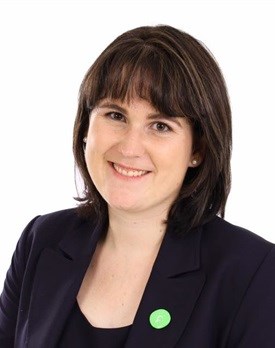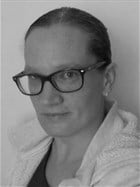Lindy Scott may not quite have reached her 30s yet, but this focused Wits Fine Art graduate and 2017 Entrepreneur of the Year nominee has certainly not let her youth dictate her aspirations and career path.

Lindy Scott
Born and raised in Johannesburg, Scott joined a teambuilding company following her graduation from the University of Witwatersrand. There she was given the opportunity to work with one of the company’s international partners based in Belgium, as well as the chance to work for the European Special Olympics Summer Games.
Upon her return to South Africa, Scott joined a small graphic design agency, where she met her now-business partner, Kay Inkster through a project on which they were working. During this time they merged their ideas for a business, which eventually resulted in the launch of Conceptual Eyes - a creative agency focused on internal communication (business and strategic communication) for large labour forces, offering concept development, strategy workshops and visual communication to help bring business strategy to life.
So how do you go from studying Fine Art to establishing a business like Conceptual Eyes?, Scott asks. “I didn’t want to be a traditional artist as my interest lay in the creative process and collaboration. I also didn’t want a traditional 9 to 5 job. I always looked at the jobs I had as research projects.
“It all fell in place for me during my time in Europe. A friend asked me, ‘How can you put a green dot on a canvas and call that art?’ I was completely stunned as I had this conversation many times before about what makes art ‘art’.”
Scott describes herself as focused, loyal, brave, intuitive, fun and imaginative. She believes her strengths are understanding people, being able to connect concepts and people easily and fast, someone with a good memory that pays attention, and a person that is open and interested in others.
Her philosophy in life is that there is a ‘difference between being an artist and being creative’.
“That is the philosophy of Conceptual Eyes. You can be creative without being artistic,” she says.
Scott recently started boxing in her free time, in order to clear her head and step away from her laptop for a few hours a week.
She explains where she gets her focus from: “I went to an incredible high school where their motto is ‘skilled for life’ and I think this gave me a very solid foundation.”
What are some of the challenges you've faced getting started and how did you overcome them?
My biggest challenge I faced was not fully understanding finance, the way in which I overcame that was to do a Get Smarter Course. Learning while building the business was the best way to overcome challenges. We embraced a fail fast approach to business and have consciously learned from every mistake or challenge.
What are the best and worst things about being an entrepreneur?
Best part: Being able to watch people grow and having the freedom to innovate. You have to push yourself and set yourself goals and challenges. We call it “daring to dream” which is a lesson I learnt from my business mentor. I love that entrepreneurship gives me the platform to dream for the business and for our clients. Creativity is really contagious, to quote Einstein.
The worst part: Paperwork.
What's the most valuable lesson you've learned so far?
The most valuable lesson I have learnt is to trust your own judgement and unique set of skills/perspective. When I began my journey as an entrepreneur (at 25), I was conscious of my age and how my clients would perceive my skill base or experience. This was definitely a challenge I had created in my own mind though, as it was never brought up by clients. I realised I needed to readjust my thinking and take action so I built our marketing/brand strategy around the notion of fresh, young, innovative and in touch with trends. I combined the strategy with a serious and professional tone and this approach has proven to be successful.
Learning to remain focused with external distraction was a very valuable lesson. The second challenge I faced as an entrepreneur was external pressure to find a work-life balance. Work-life balance was not my priority, building the business was fun and I loved every second of it. From the outside it appeared that work had taken over my life, especially in the early days. In a way it was true but I do not regret it. 100% focus for three years gave Conceptual Eyes a solid foundation on which to build and scale. My business partner Kay Inkster and I would say, “We will find work-life balance when the books balance!” and in a start-up, finance, profit and cash flow are all challenges of their own.
You were recently nominated for 2017 Entrepreneur of the Year® competition – what does this recognition mean to you?
The recognition from EOY 2017 was a great honour and I was very proud to meet and be a part of the competition. Meeting like-minded South African entrepreneurs is inspiring and I am happy to be part of a network all working towards the same common goals.
Where do you see yourself in five years?
In five years I see myself leading creative teams across the continent and having our Health and Safety Campaigns rolled out across Africa. I am passionate about “creativity saving lives” and I hope for this to be my focus in five years. In five years I strive for Conceptual Eyes to have a franchise model and be active across the globe.
What advice do you have for other entrepreneurs just starting out?
Learn and read as much as you can about business, build entrepreneurship research into your daily life.
Celebrate every win no matter how small. I often buy myself flowers to remind myself how liberating and empowering entrepreneurship is but also that it is a daily challenge. Flowers don’t last forever and you need to keep working towards the next win.
Find a network of people who inspire you and who you can learn from; share your story and ideas with them. You never know from who or where your next burst of inspiration can come from.
Do not have a hierarchy of days when building a business. A Tuesday and a Sunday are the same and you do what you need to do when it needs to be done.


















































